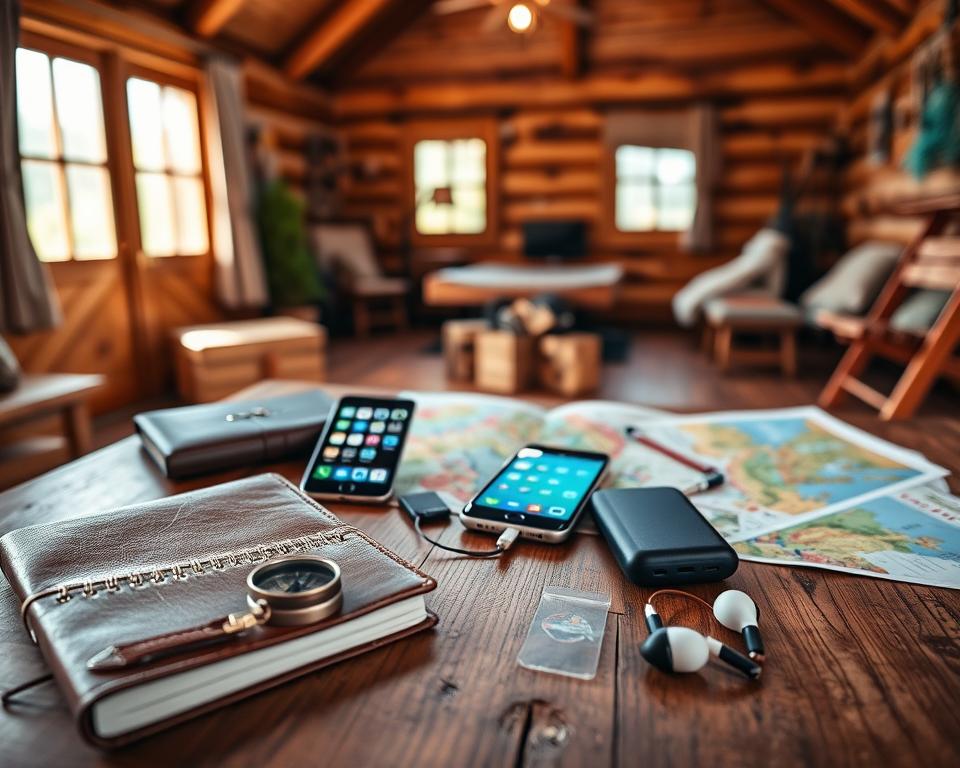Advertisements
In 2025, your informed decisions will be worth more. Here's some practical information to help you make better decisions without complicating things. experience Travel today depends as much on rules and prices as on small habits you can apply now.
Following the global reopening, you'll see more dynamic prices, flexible policies, and technology that simplifies essential steps. Plan your flights, transportation, and accommodations; avoid peak seasons when possible, and check immigration regulations before you travel.
When it comes to luggage and clothing, travel light: mix and match outfits and prioritize carry-on to save money. Regarding finances, the FDIC suggests carrying little cash, using credit cards for better exchange rates, and understanding potential hold fees at hotels and car rental agencies.
Use simple practices: TSA lock, cloud backups, and activate roaming as needed. Consult official sources, verify information, and travel responsibly to get the most out of your trip without falling for false promises.
Introduction: What changed in 2025 and how to travel better this year
Safe travel in 2025 starts with validating data and notifying your issuers. The current situation calls for simple actions: review entry requirements and confirm deadlines before booking. Think of the time you'll save by checking official requirements and maps of the places you plan to visit.
Institutions like the FDIC recommend notifying your card issuer and paying any bills that coincide with your travel dates. Assist Card suggests checking with embassies and consulates in the country you're visiting to verify your travel permits and vaccinations. Activate roaming or an eSIM and set up usage alerts to avoid unexpected account blocks.
- Choose destinations after confirming official data and cancellation policies.
- Book with flexible schedules to optimize your time.
- Verify cards and payment alternatives before leaving.
- Travel lightLess luggage, more mobility everywhere.
Always compare official sources and recent experiences.Respecting local rules and confirming information keeps you calm and ready to enjoy your trip to the fullest.
Panorama 2025: New ways to choose destination and time
Choosing when and where to travel in 2025 can make a difference in price and experience. Pressure decreases during the shoulder and off-seasons because fewer tourists visit the main attractions, reducing queues and demand for services. This translates into more affordable prices and a more comfortable experience.
Travel off-season to save money and be more comfortable
Assist Card recommends avoiding peak travel dates to save money. Check availability and prices by country before booking. Refundable bookings allow you to adjust your dates if the weather changes or unexpected events occur.
Micro-breaks and “slow travel” to make the most of your time
Two- to four-day micro-breaks are ideal for exploring neighborhoods and markets at a leisurely pace. Plan short trips and realistic goals: a plaza, a market, and a walk might be all you need.
- Choose destination with a flexible schedule to avoid queues.
- Adjust the timing according to festivals and weather to live authentic experiences.
- Prioritize less travel and more connection with local people.
Ask residents for off-peak times and explore alternative spots. Avoid crowded routes and leave gaps for walking; this way you make better use of your time and enjoy your trip more.
Your money on the road: pay less in fees and travel more safely
Paying less in fees starts with planning how and when to use cash and cards. Decide on an amount for minor expenses and tips; carry the rest on cards to take advantage of a better exchange rate.
Divide Keep your cash in several secure places: wallet, card holder, and a hidden accessory. This reduces the impact if you lose something or are robbed.
Cash vs. cards: how much to carry and how to divide it
Set a daily amount for transportation and tips. The rest can be paid to a card or account you normally use in the United States.
Choose local currency and avoid hidden fees
When you pay, always choose the currency Shop locally if your card doesn't charge a currency exchange fee. Avoid dynamic currency conversion; it's usually more expensive.
ATM fees and cheaper alternatives
Check with your bank about international withdrawal fees. Withdrawing with a debit card is usually cheaper than a cash advance. credit.
Hotel or rental car holds: how to avoid running out of credit
Rent or book knowing that many hotels and car rental companies pre-authorize part of your credit card. Bring at least two cards and notify the bank before leaving.
- Define a amount for cash and store receipts.
- Ask about ATM fees and prioritize debit card withdrawals.
- Don't lose sight of your card and turn on notifications.
- Divide funds and avoid depending on a single instrument.
Documents and backup: passport, copies and emergency contacts
Before leaving, make sure your documents are duplicated and accessible in more than one place. This reduces stress if you lose something or are robbed.
Make one physical copy and one in the cloud Passport, tickets, and reservations. Protect links and files with a password and activate offline access for emergencies.
Physical and cloud copies
Check that your passport is valid for at least six months if your destination requires it. Keep a printed copy separate from the original and another copy in a cloud service.
List of numbers and what not to include
Prepare a list with phone numbers for banks, card issuers, insurance companies, embassies, and emergency contacts.
- Do not write down full card numbers, SSNs, or sensitive data; only customer service phone numbers.
- Carry the list in a different pocket than your documents and keep your cards and copies separate to minimize risks.
- Archive booking confirmations in the cloud and add passport and policy expiration alerts.
Immigration regulations 2025: visas, vaccinations and requirements by country
Before booking, please confirm current immigration requirements. for each country you plan to visit. The rules may change without notice and vary depending on the type of entry: tourism, business, or transit.
Check with embassies and consulates before buying
Contact the embassy or consulate of the destination country for official information on visas, fees and passport validity requirements.
Don't rely solely on forums or social media. Note down opening hours and passport photo requirements if you need to handle in-person procedures.
Travel insurance and certificates that they might ask for
Check if they require insurance with minimum coverage or vaccination certificates. Assist Card recommends confirming this information before traveling.
- Confirm Check official websites for visa information, fees, and passport validity.
- Check if they require insurance and what type. documents They support the policy.
- Purchase flights and accommodations that are refundable until the information is validated.
- Each traveler must check the guy permitted entry and required tests.
- Example: some destinations require a passport valid for 6 months or proof of funds.
Practical tip: Bring printed copies of your certificates and passport photos in case of system failures. The FDIC and FTC resources advise notifying your bank to avoid payment blocks during your trip.
Personal safety and common scams in airports and cities
Maintain simple and practical protocols to protect yourself without causing alarm. A couple of habits will help you reduce risks in crowded areas and while in transit.
Avoid displaying valuables and keep your purse and wallet in sight.
Keep your bag in front of you and always closed in areas like X-ray machines, check-in, and the door. These areas tend to attract crowds and pickpockets.
Don't show Expensive watches, cameras, or wads of cash; discretion saves trouble.
Notify your bank and keep track of your receipts
Before you leave, notify your bank to reduce account blocks for unusual activity. Monitor charges and keep receipts for all purchases.
If a payment is rejected, call and authorize the transaction quickly and clearly.
Hotel safe: uses and limitations
The safe provides protection, but it can be opened with a master key or override code. Keep the passport and valuables when necessary, and remove them on your way out if you prefer.
Hang up a "Do Not Disturb" sign if you leave items in the room for a short time.
- At airports, keep an eye on your bag in the door and at baggage claim.
- Don't lose sight of your cardAlways ask for a receipt.
- Memorize PINs that aren't obvious dates and don't share your numbers.
Travel tips for 2025: practical and flexible planning
A simple schedule with a time buffer saves you a lot of trouble. Design a basic plan with milestones and breaks. Leave buffers between flights, transfers, and activities so you can react without losing money.
Realistic timeline and budget with backup plans
Create a budget with clear categories and set aside a contingency fund of 10–15% for unexpected expenses. Book nights at accommodations with flexible policies and save screenshots of your receipts.
Payments and invoices up to date before leaving
Pay bills and schedule debits Notify your bank before your trip to avoid surcharges. Reduce account blocks and bring a backup card; be aware of its credit limit.
- Itinerary base with margins and breaks.
- Contingency fund 10–15% and offline vouchers.
- Flexible bookings and access to receipts in one app.
- Schedule payments and notify the issuing entity.
- Short list of local resources: transport, pharmacies and traveler services.
Case study: If your flight is canceled, use refundable fares to rebook hotel nights without penalty and avoid bigger losses. These steps give you more control and less stress on the road.
Connectivity and data: roaming, Wi-Fi and cloud backups
Connecting without surprises involves comparing plans, protecting your files, and managing calls through apps.
Roaming and eSIM: Compare local eSIMs and international plans before activating roaming. Only activate roaming if the cost is worth it to avoid unexpected charges.
Active roaming, eSIM and call savings
Use app-based calling over secure Wi-Fi to reduce charges. Consider a temporary eSIM if you'll only be in one country; if you travel frequently, an international plan might be more cost-effective.
Upload photos to the cloud and free up space securely
Automatically back up photos and documents to the cloud and enable 2FA. Assist Card suggests syncing photos to avoid losing memories. Avoid open networks for sensitive transactions and use a reliable VPN.
- Discharge Offline maps and QR codes for bookings.
- Bring a charger and power bank; locate official charging stations.
- Review fair use policies to avoid using up your plan.
- Verify that your digital payment methods work with limited connectivity to avoid affecting your credit due to rejections.
Practical tip: It schedules reminders to pay for online services and saves local copies in case of network failures.
Smart luggage: less weight, more solutions
Carrying less allows you to move faster and avoid unexpected problems in transit. Prioritize carrying only cabin baggage whenever possible; you'll save time on claims and reduce the risk of loss.
Use TSA lock On main zippers: it's practical and, in several countries, recommended for security. Keep valuables with you at all times in the cabin.
Matchable clothes and useful accessories
Choose clothes in neutral tones and light layers. With four basic pieces and two layers, you can create several looks without adding bulk.
Add a foldable backpack for excursions or unexpected shopping trips and a wet clothes bag to separate dirty garments.
Organize according to route and type of transport
- Cabin For short routes; avoid waiting for luggage.
- Soft suitcase if you'll be traveling by train and bus; hard-sided for flights with multiple layovers.
- Identify your suitcase inside and out; avoid putting your full home address on it.
Simple rule: Don't carry more than you can comfortably hold in one hand. This gives you flexibility and less stress at every stage of your trip.
Accommodation and card blocks: what you need to know
Knowing how pre-authorizations work prevents surprises in your budget. Many hotels hold a portion of your credit card upon check-in. This hold covers the room and incidental expenses.
Deposits, pre-authorizations and how to avoid them
Upon arrival, the hotel may perform a pre-authorization on your credit cardThis retention temporarily reduces your credit available and may cause rejections if you reach the limit.
Always ask the amount Estimated deposit amount and when it's released. If that's not enough, use a secondary card for everyday expenses.
Refundable reservations for uncertain times
Choose rates with refundable prepayment or low deposits when your dates aren't confirmed. This way you can move nights without high fees.
- Ask for an estimated deposit when booking.
- Use one card for blocking and another for purchases.
- Review the final invoice and keep the receipts.
- If a charge is declined, check with your bank and the FTC about declines.
Local transport: safe and affordable options
When moving around the city, choosing the right transport improves your safety and budget.
Value public transport when the network is clear and has reliable timetables. Well-run buses and subways usually offer more. security during peak hours and on tourist routes.
When is public transport or authorized services advisable?
For nighttime journeys, prioritize services authorized by apps or the hotel. In high-risk cities, take registered taxis from the hotel entrance and note the license plate and route.
- Choose public transport in well-connected and signposted locations.
- Prefer authorized services for nighttime travel or less busy areas.
- Avoid unidentified taxis; save vehicle details if you take one.
- Pay with cards to track expenses; when it suits you, select currency local payment.
- Bring small amounts of cash for buses or tolls if they don't accept them. credit card.
Check maps and wait times to plan your transfers. Review reviews and city notices before you go: that way your journey It will be safer and more efficient.
Culture and gastronomy: learn about the place safely
Learning to eat and shop respectfully improves your experience in new places. Observe local customs and act with goodwill: a smile and a greeting open doors.
Respect customs When taking photographs: ask people for permission before taking pictures. In many places, this gesture builds trust.
Respect for local customs and responsible purchasing
Buy local products with traceability and avoid items that may be illegal or from protected species. Showing interest without demanding low prices maintains cordial relationships.
- Observe local dress codes and greetings; a smile opens doors.
- Negotiate treat with respect and pay a fair price; don't take advantage of people's needs.
- Guard Small amounts of cash on hand for quick transactions.
Street stalls: freshness and movement as a sign
Street stalls look for constant turnover and lots of people eating; that usually indicates fresh product.
Opt for bottled water that you open yourself and avoid questionable raw food. A clear example is grilled food that's freshly prepared.
Sustainable tourism in 2025: impact and best practices
Small decisions along your route can reduce your environmental impact without complicating your itinerary.
Choose certified operators and prioritizes experiences that demonstrate transparency throughout the supply chain. Assist Card supports ecotourism and agencies with recognized certifications in the countries you visit.
Choose operators and avoid harmful products
Don't buy handicrafts that include protected flora or fauna. Support local businesses that demonstrate traceability and use sustainable materials.
Reduce waste: reusable water and less plastic
Bring a reusable water bottle and a shopping bag; opt for rechargeable products and accommodations that manage waste. Walking or cycling for short journeys also reduces emissions.
- Choose Certified operators in each destination.
- Avoid souvenirs made with protected species.
- Bring a reusable bottle and a cloth bag.
- She prefers rechargeable products and accommodations with waste management.
Take measurable steps: book by consolidating journeys, support local businesses, and maintain the same manner Simple in everyday life. That consistent approach has a real impact on your travels and communities.
Traveler's health: sensible prevention and resources
Protect your well-being while you travel It involves practical steps that you can apply today.
Hygiene and basic first aid kit
Wash your hands before eating and carry hand sanitizer when traveling. Keep your nails short and avoid touching your face in crowded places.
Prepare a first aid kit Bring your prescription medications, basic pain relievers, bandages, and antiseptic. Carry copies of your prescriptions for reference and check liquid limits in the cabin.
Mosquito protection
Wear clothes from sleeve Stay out of the sun at dawn and dusk in areas with insects. Apply repellent as directed and consider using a mosquito net if you sleep outdoors.
Lower the temperature or ventilate the room to reduce insects. In case of severe bites, seek professional help and avoid self-medicating.
- Check vaccines and additional measures for your destination with official sources.
- Save Assist Card phone numbers, your insurance and emergency numbers.
- Download maps of pharmacies and hospitals; they are resources useful in any eventuality.
Useful resources and real-world examples for dealing with unexpected situations
Resolving financial emergencies while traveling requires clear steps and active contacts. If you lose money or documents, act quickly: block and call your senders and use secure channels to move funds.

Transfers, advances and secure funds remittance
Banks can manage advances with card Credit cards are available, but they have fees and interest. Consider transfers from your home account, money orders, or direct payments to the hotel.
Call immediately If your wallet is stolen and you use the numbers of contact saved to block cards and request help.
Maps, markets and local tourist offices
Use tourist offices and official maps to find your way around. Ask locals about markets and courier services if you want to send something. products bought from home.
- Guard data Offline key: addresses, reservations and receipts.
- Ask your bank for transfers or advances, understanding their fees for credit.
- Document each transaction with screenshots and receipts to make claims later.
Conclusion
Finalize your plan knowing that the best tool is information: Check requirements by country, be careful with your payments, and use simple practices that give you security.
At the moment You can choose calmly: prioritize health, finances, and documents to improve your experience and that of others.
Share these ideas with friends and other travelers. Always verify information with official sources and adjust your route accordingly. If you maintain this responsible approach, each trip will offer valuable lessons and benefits for both you and your destination.



